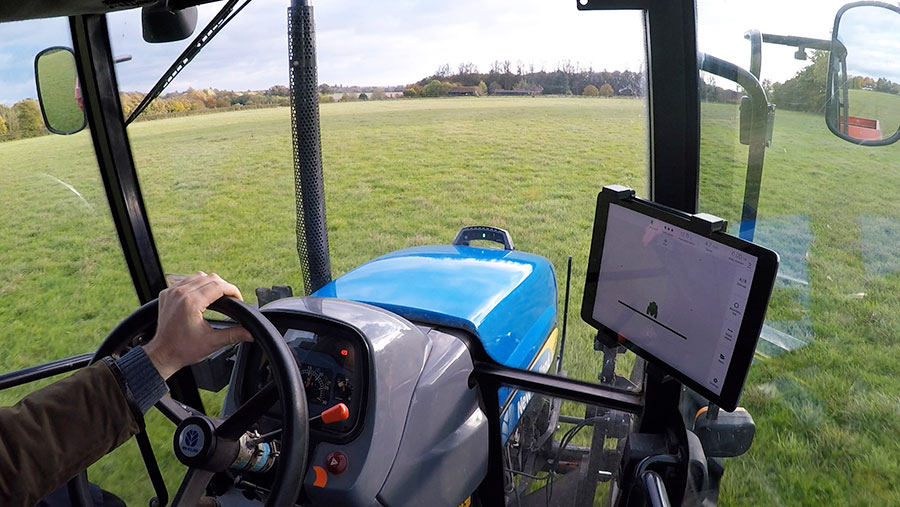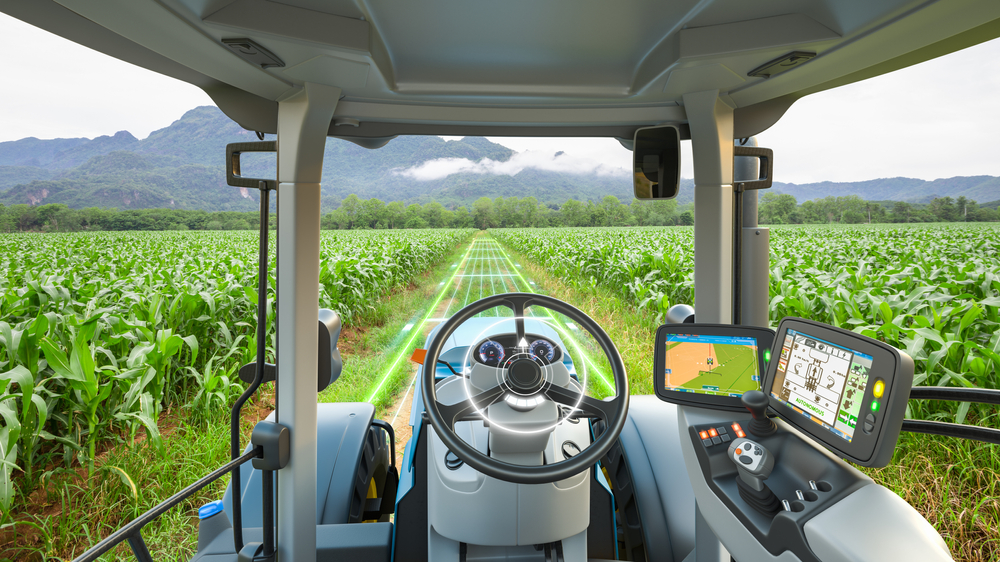As modern agricultural production continues to evolve, it faces many serious challenges, such as labor shortages and production inefficiencies. Farmers not only need to improve labor efficiency, but also need to effectively manage the production process to cope with the increasingly complex production demands. Agricultural intelligent systems have emerged as the key to improving farm management efficiency, especially in the application of navigation through GPS, automated driving, and precision agriculture technologies. Agricultural intelligence systems can not only significantly reduce labor costs, but also improve operational precision, reduce errors, and provide more precise control and management of agricultural production.
This paper will explore how agricultural intelligence can help farmers improve operational efficiency and optimize production management through technological innovations, especially GPS navigation, autonomous driving and precision agriculture technologies. Through an in-depth analysis of the application of agricultural machinery in efficient operations such as large-scale planting, seeding, and fertilizing, the paper demonstrates how these technologies can bring economic benefits and help farmers gain more profit in an increasingly competitive market.
With the continuous advancement of intelligent technology in agriculture, farm management will see unprecedented changes. Through the use of intelligent equipment, not only can operational efficiency be improved, but production costs can also be reduced, bringing sustainable growth to agricultural production. Next, we will explore how specific technologies can be practically applied in agricultural production, especially the advantages and economic benefits in large-scale farming operations, to help you better understand this revolutionary shift.
Contents
- 1 I. Core Technologies of Intelligent Agricultural Machinery
- 2 II. Application of Intelligent Agricultural Machinery in Large-Scale Cultivation
- 3 III.Application of Intelligent Farm Machinery in Efficient Harvesting
- 4 IV. Economic and Production Benefits of Intelligent Agricultural Machines
- 5 Conclusion
I. Core Technologies of Intelligent Agricultural Machinery
1. GPS Navigation System
Technical Principle
GPS navigation system utilizes satellite signals to accurately determine the location of farm machinery and combines real-time data to adjust the path of farm machinery. Through high-precision positioning technology, farm machinery can realize precise operation, thus improving the efficiency and accuracy of operation, especially in large-scale farmland and complex terrain.
Application Scenarios
Precise plot planning: GPS navigation can help farm machines automatically plan optimal operation routes on different farmlands, reducing overlapping use between plots.
Automated Tillage Paths: Farming machines automatically navigate according to preset paths to optimize tillage, seeding, fertilizer application and other operations.
Intelligent operation linearization: Through the combination of GPS and agricultural management system, the operation of farm machinery no longer relies on manual control, which greatly improves the accuracy and stability of production.
Economic Benefits
Reducing operation duplication: precise control of farm machinery operation routes through GPS system avoids duplication of farming and land waste and saves resources.
Improve land use rate: The precise operation route reduces the waste of blank area, which makes the land more fully utilized.
Reduced production costs: By increasing efficiency and reducing labor errors, farmers can significantly reduce production costs, especially in mass production environments.

2. Autopilot Technology
Technical Principles
Autopilot technology relies on sensors, artificial intelligence, and data feedback systems to enable farm machinery to automatically complete complex operational tasks without human intervention. Through image recognition, environment sensing and automatic control technology, the farm machine is able to drive freely in the farmland, ensuring the accuracy and safety of the operation.
Application Scenarios
Automated Tillage: Suitable for large-area farmland operations, it can automatically perform tasks such as plowing, seeding and fertilizing without human intervention.
Efficient Harvesting: Autopilot technology can help farm machinery to precisely control the harvesting process, improve operation speed and reduce crop loss.
Fertilizer and irrigation: Farming machines can accurately perform fertilizer and irrigation tasks with autonomous driving technology, reducing resource wastage.
Economic Benefits
Labor Cost Savings: Autopilot technology can significantly reduce the reliance on labor, especially on large-scale farms.
Improve efficiency: Automation not only improves efficiency, but also reduces human error by maintaining consistent quality of work over long periods of time and at high levels of intensity.
Reduce the cost of long-time operation: the self-driving technology supports 24-hour operation, which reduces the problem of operational inefficiency caused by human fatigue and improves the overall production efficiency.

II. Application of Intelligent Agricultural Machinery in Large-Scale Cultivation
Large-Scale Cultivation Operations
Application Scenarios:
Intelligent agricultural machinery has demonstrated its wide application in large-scale agricultural production, especially in automated cultivation processes. With the development of agricultural mechanization and the increasing scale of farms, the self-driving function and precise operating system of intelligent farm machinery can efficiently complete the work of seeding and plowing, reduce manual intervention and improve work efficiency.
Intelligent operation: through GPS positioning, self-pilot technology and precise seeding guidance system, it ensures the accuracy of every operation path. The intelligent system can automatically adjust the operation parameters according to the terrain, crop types and soil characteristics, precisely control the planting depth and spacing, and optimize the operation quality.
Automated seeding and operation path planning: The intelligent farm machine carries out automated operation according to the preset working route to ensure uniform seeding of crops, reduce unnecessary repeated operations and mis-sowing and omission, and improve crop yield and quality.
Economic Benefits:
Improve planting accuracy: Precise sowing makes crop growth more uniform, reduces waste of resources caused by uneven sowing, and improves yield.
Reduced labor costs: automated seeding and operation path planning reduces reliance on labor and lowers labor costs.
Reduced operating time: Thanks to the efficient operation of automated systems, farmers are able to accomplish more work in less time, improving overall operational efficiency and saving operating costs.
Precision Sowing and Fertilizing
Application Scenarios:
Precision Sowing and Fertilizing System provides accurate soil moisture and nutrient content detection data through the combination of modern agricultural technology, using smart sensors and plot analysis technology to determine the amount of fertilizer to be applied and the depth of seeding for each plot.
Precise Sowing: Intelligent farm machinery precisely adjusts the sowing depth and planting density according to real-time soil data to ensure that every seed gets the right environment.
Precise Fertilizer Application: Intelligent farm machinery combines soil detectors, sensors and GPS systems to analyze the soil conditions of each plot of land and automatically adjusts the amount of fertilizer applied to ensure the precise distribution of nutrients, avoiding the waste of resources and environmental pollution brought about by over-fertilizer application.
Economic Benefits:
Reduce fertilizer waste: Through the precision fertilizer application system, the overuse of fertilizer is avoided, thus reducing fertilizer costs and environmental pollution.
Enhance crop yield: Precise control of fertilizer application enables crops to receive sufficient nutrition, which promotes growth and enhances yield.
Enhance soil health: Precise fertilization helps the balanced distribution of soil nutrients, avoids soil acidification or salinization, and improves the long-term utilization value of the land.
Precision Irrigation and Moisture Management
Application Scenarios:
Intelligent farming machines are not only limited to seeding and fertilizing, but can also achieve intelligent moisture management through integrated precision irrigation systems. Through soil moisture sensors and automated water pumps, the farm machine can automatically adjust the amount of water according to the moisture requirements of different soils, ensuring that the soil in each area is reasonably irrigated.
Soil moisture monitoring: the sensor monitors the soil moisture in real time and feeds back to the intelligent system to automatically adjust the amount of water according to the crop requirements.
Automated pump control: Combined with the intelligent control system, the pump switch is automatically adjusted to ensure efficient use of water.
Economic benefits:
Save water resources: Through precise irrigation, over irrigation and water waste are avoided, especially in water-stressed areas, which can significantly reduce the amount of irrigation water.
Reduce irrigation costs: Intelligent irrigation system can automatically adjust the amount of water at different stages of crop growth, reducing manual regulation and saving operating costs.
Promote healthy crop growth: Precise water control ensures that crops receive sufficient water support, avoiding the impact of too much or too little water on crop growth.
III.Application of Intelligent Farm Machinery in Efficient Harvesting
Automated Harvester
Application Scenario:
The application of intelligent self-driving harvester in large-scale farmland harvesting, especially in the harvesting of bulk crops such as wheat and corn, demonstrates its high efficiency. Through the introduction of intelligent technology, the automated harvester is able to automatically adjust the operating parameters according to the farmland environment, crop characteristics and harvesting conditions, ensuring the efficiency and precision of the harvesting process, reducing manual intervention, improving work efficiency and reducing the workload of farmers.
Intelligent navigation system: The auto-pilot system combines GPS and inertial navigation to accurately plan the harvesting path, avoiding repetitive work and missed harvesting. Through efficient navigation algorithms, it ensures that the harvester travels accurately in complex terrain.
Automated Operation Adjustment: Based on real-time feedback, it automatically adjusts operation parameters, such as traveling speed and cutting table height, to ensure that crops are not damaged and to improve harvesting efficiency.
Economic Benefits:
Improve harvesting efficiency: through the automated control system, the intelligent harvester is able to complete the task of harvesting a large area in a shorter period of time, which significantly improves the operational efficiency and reduces the waste of time.
Reduce labor input: Intelligent harvester can reduce the need for manual operation, reduce labor costs and at the same time, reduce the loss caused by improper manual operation.
Reduce crop loss: By precisely adjusting the harvester’s working parameters, crop loss is minimized, ensuring that every crop is harvested to the maximum extent.
Precision Harvesting Technology
Application Scenarios:
Intelligent harvesters use high-precision sensors and automated control systems to enable them to accurately determine the growth status, maturity and crop density of the crop, so that they can adjust the harvester’s cutting speed, cutting table height and handling methods to ensure that every piece of crop is efficiently harvested.
Sensor and visual recognition technology: Combined with sensor and visual recognition technology, the intelligent harvester can analyze the maturity level of the crop based on real-time crop information collection and automatically adjust the parameters of the harvester in order to achieve accurate harvesting.
Adapt to different crop characteristics: Different crops have different growth cycles and forms, the intelligent system can automatically adjust the operation strategy according to the crop type to ensure that whether it is corn or wheat, it can be harvested at the best time.
Economic Benefits:
Precise operation, less waste: through precise sensors and intelligent system control, unnecessary crop loss is reduced, further improving farm productivity.
Increase crop utilization: Intelligent harvesters minimize crop breakage and ensure that every crop particle is efficiently harvested, increasing farm profitability.
Reduce energy consumption: Through the intelligent control system, the energy consumption during operation is automatically optimized, which reduces the energy input for each operation and improves economic efficiency.
Improve operation efficiency and reduce losses
Application Scenario:
In large-scale harvesting, operation efficiency and loss reduction are two key factors. The precision and stability of intelligent harvesters can effectively improve operational efficiency while reducing crop damage and loss.
Automatic adjustment of operating parameters: The intelligent system can automatically adjust the harvester’s cutting table height, speed and other parameters according to crop conditions and real-time environmental changes, reducing crop loss and waste.
Economic Benefits:
Reduce loss and increase yield: Precise operation ensures that the crop is not damaged, reduces waste and loss, and ultimately increases the actual harvested amount.
Enhance work efficiency: Automatic adjustment and intelligent control improves the accuracy and stability of operations, reduces downtime and interruptions, and improves overall operational efficiency.
Reduce maintenance and operating costs: Intelligent harvesters reduce the occurrence of failures brought about by human operation, reduce the frequency of maintenance and related costs, and extend the service life of the equipment.
IV. Economic and Production Benefits of Intelligent Agricultural Machines
Reducing Labor Costs
Reducing the Need for Manual Labor:
Intelligent agricultural machines autonomously complete many high-intensity labor tasks through automated management and operation, significantly reducing reliance on manual labor. For example, intelligent harvesters are able to accurately harvest crops without human intervention, and autopilot systems can accurately navigate and adjust operating paths in response to environmental changes, minimizing the need for human involvement. This not only reduces labor costs, but also improves efficiency while reducing errors and losses due to manual operations.
Automated operations: automation technology makes farm management more efficient, enabling farmers to maintain efficient operations and optimize the allocation of human resources without relying on a large number of laborers.
Labor Cost Optimization: By reducing manual intervention, farmers are able to use the labor cost savings for other more important areas of agricultural production, such as equipment upgrading or expanding the scale of operations, thus improving overall economic efficiency.
Labor Efficiency Improvement
Intelligent Farming Machines Improve Operational Efficiency:
Intelligent farming machines are able to automate the entire operation, reducing manual intervention while dramatically increasing production efficiency. For example, through accurate GPS navigation systems and crop sensing technology, intelligent harvesters are able to complete large-scale harvesting tasks in the shortest possible time, and optimize operation paths and speeds according to factors such as terrain, soil, and crop types, reducing time wastage.
Efficient operation cycle: Intelligent equipment reduces the downtime caused by equipment adjustment and improper manual operation during operation, making the operation cycle significantly shorter and improving the efficiency of crop harvesting.
Intelligent Monitoring and Adjustment: The real-time data monitoring function of the equipment can adjust the operating parameters at any time during the operation to ensure that each operation can be carried out under the optimal condition, which further improves the labor efficiency.
Enhancing Resource Utilization
Precision Operations:
By introducing precision agriculture technology, intelligent farm machinery can help farms improve resource utilization efficiency, especially in soil, fertilizer and water management. Precision technology can monitor soil moisture, temperature and crop growth in real time, and intelligent farm machinery can adjust operating parameters according to these data to reduce resource waste.
Soil and water management: Precision agriculture technology helps farms utilize soil and water resources more efficiently, thus avoiding overuse and waste and improving the quality of crop growth.
Efficient Fertilizer Utilization: Through precise measurements and rational fertilizer application, fertilizer waste is reduced, which not only saves costs, but also improves soil fertility and promotes healthy crop growth.
Long-term Cost Savings
Equipment Maintenance and Continuous Use:
The technological innovation of intelligent farm machinery not only improves operational efficiency, but also greatly extends the service life of the equipment. Intelligent systems are able to detect the operating status of equipment in real time, identifying potential failure risks in advance and reducing unnecessary downtime for maintenance.
Reduced equipment failure: The automated fault diagnosis system can reduce the equipment failure caused by human operation errors, reduce the frequency of repair, and save the maintenance cost.
Efficient operation: Long-term stable operation of equipment reduces losses due to faulty downtime and optimizes the life cycle management of equipment, thus achieving long-term cost savings.
Energy Saving and Environmental Benefits
Energy Saving:
The design of intelligent farm machinery not only takes into account the improvement of operational efficiency, but also focuses on the reduction of energy consumption. For example, the intelligent system dynamically adjusts power output according to crop demand and workload, making energy use more efficient and reducing unnecessary energy waste.
Efficient energy management: through intelligent control, farm machinery can automatically adjust power at low loads, reducing energy waste while improving fuel efficiency.
Environmentally friendly operations: Reducing energy consumption not only helps reduce production costs, but also plays a positive role in reducing greenhouse gas emissions and promoting sustainable agricultural development.

Conclusion
Intelligent farm machinery systems are significantly improving farm management efficiency, especially through GPS navigation, autonomous driving, and the widespread use of precision farming technologies. The introduction of these technologies not only reduces reliance on manual operations, but also optimizes operational precision and efficiency, helping farmers better cope with high-intensity agricultural tasks such as large-scale planting, seeding, and fertilizing, thereby effectively reducing production costs and increasing output efficiency. Through efficient operations and precise resource management, intelligent farm machinery significantly improves the sustainability and economic efficiency of agricultural production.
The advice for farm owners is that they should choose the right intelligent farm machinery according to their scale of agricultural production and needs. Choosing the right equipment can not only improve the efficiency of farm operations, but also bring higher production benefits to the farm. Choosing farm equipment with advanced technical support can help farm owners stand out in the fierce market competition.
As an innovative brand in the field of intelligent farm machinery, MINNUO provides farms with highly efficient and intelligent agricultural machinery, especially in the application of GPS navigation, self-driving technology and precision agriculture, which helps farmers to improve production efficiency, reduce costs and realize long-term economic benefits. With its advanced technology and cost-effective price, MINNUO will be the best choice for upgrading your agricultural mechanization, helping your farm to move towards a smarter and more efficient future.

